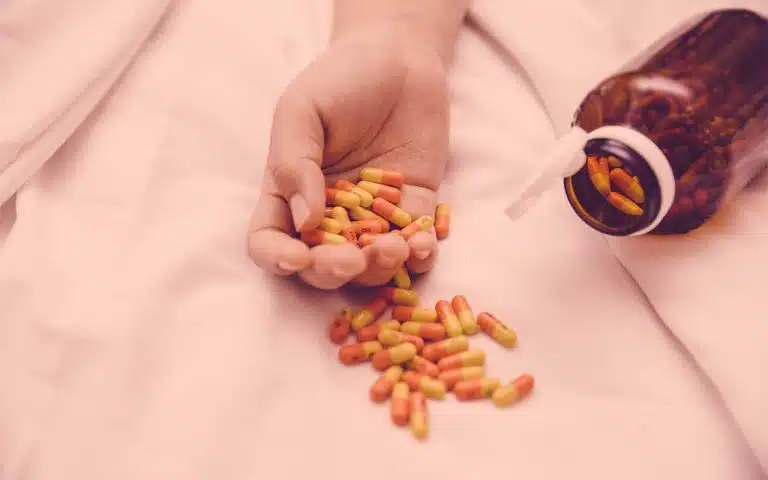Adderall Overdose | Symptoms, Max Dose, & Treatment
- Can You Overdose On Adderall?
- How Much Adderall Does It Take To Overdose?
- Side Effects
- Overdose Prevention
- Overdose Treatment

Adderall is a central nervous system prescription stimulant medication and consists of a combination of dextroamphetamine and amphetamine. It is normally used to help with attention deficit hyperactivity disorder (ADHD) or impulse control.
Unfortunately, it’s often abused by high school and college students as a study drug. Due to its addictive qualities, the Food and Drug Administration (FDA) considers it a controlled substance and warns of the dangers of overdosing.
Adderall Uses & Effects
Adderall is prescribed as an attention deficit hyperactivity disorder or ADHD medication but is also given to those suffering from narcolepsy.
The drug raises the norepinephrine and dopamine levels in your brain to help with concentration. Adderall XR is the same medication just in its extended-release form so the effects last throughout the day.
Can You Overdose On Adderall?
You can overdose on Adderall. If you take more than the amount prescribed to you, or take large amounts without a prescription, it’s very easy to overdose on the drug.
How Much Adderall Does It Take To Overdose?
The amount of Adderall that leads to an overdose all depends on who is using it. It’s easier for a child to overdose on the drug because of their lower body mass, but the fatal amount changes from person to person.
The risk of Adderall overdose depends on:
- medical history
- how long the person used the drug
- body composition
- organ function
- pH level of digestive tract
In general, 20-25 mg/kg of a person’s body weight is considered a fatal dose. For example, 70 mg of Adderall in one day for an adult of 150 lbs is the maximum safe dose.
The typical dose of Adderall for a child is usually 2.5-5/mg per day and is never recommended to be taken in doses larger than 40/mg per day.
The most common lethal dose of Adderall has been reported between 20 to 25 mg/kg of weight.
Side Effects Of Adderall Overdose
If you suspect an Adderall overdose, there are lots of signs to check for. Signs of overdose may include:
- nausea
- vomiting
- diarrhea
- tremors
- overactive reflexes
- rapid breathing
- confusion
- aggression
- hallucinations
- panic attacks
- dry mouth
- fever
- muscle pain or weakness
- heart attack
- hypertension
- seizure
- high blood pressure
- low blood pressure
- coma
- blurry vision
- cola-colored or dark red urine
- mental health problems like psychosis
- muscle tissue breakdown
- dizziness
- fainting
- rapid heart rate
- loss of consciousness
- restlessness
- a sense of panic
- stomach upset or cramps
- tiredness
The most serious symptom of an Adderall overdose is death. Although fatalities are rare for overdosing on Adderall alone, the risk of life-threatening symptoms increases when Adderall is mixed with other substances.
Even if symptoms are mild, they can become worse over time and may be life-threatening. If you suspect an overdose, call for help or take the person to an emergency room.
How To Prevent Adderall Overdose
The best way to prevent someone from overdosing on Adderall is to only use it as prescribed and directed. This includes using it orally rather than by snorting. If you have an Adderall prescription, always listen to the medical advice of your doctor.
If you find yourself or a loved one developing an addiction to Adderall, getting into treatment and recovery as soon as possible can help prevent an overdose and further misuse.
Adderall Overdose Treatment
Treatment for an Adderall overdose will likely start with close medical monitoring and activated charcoal. The person who has overdosed ingests the charcoal and it will absorb any excess Adderall in their system and provide relief from overdose symptoms.
Their stomach might also be pumped to remove Adderall from the body. Antidepressants and benzodiazepines may be administered to reduce stress and discomfort, especially if they’re hallucinating. They may also be given beta-blockers to lower blood pressure if it’s too high.
If the person who overdosed is running a high fever, medical professionals may also try to cool the body down with various methods.
Treating Adderall Addiction
It’s never too late to seek treatment for Adderall abuse or addiction. A variety of addiction treatment programs are available to help yourself or a loved one. Call our helpline today to learn more about our treatment options, including detox support and aftercare counseling.
Written by Ark Behavioral Health Editorial Team
©2024 Ark National Holdings, LLC. | All Rights Reserved.
This page does not provide medical advice.
FDA - FDA Adderall classification and potential for abuse
National Institute of Drug Abuse - How to treat/deal with an Adderall overdose
National Library of Medicine - Adderall overdose effects, schedule II classification, used by college students
National Library of Medicine: MedlinePlus - Uses for prescribed Adderall and overdose effects
Questions About Treatment?
Ark Behavioral Health offers 100% confidential substance abuse assessment and treatment placement tailored to your individual needs. Achieve long-term recovery.
100% confidential. We respect your privacy.
Prefer Texting?
Our friendly support team is here to chat 24/7. Opt out any time.







 Learn More
Learn More








